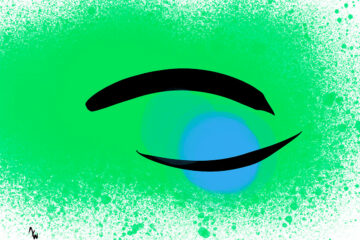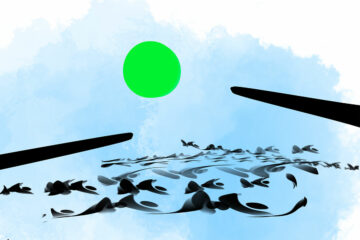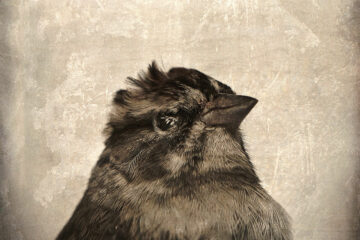Sunlight and a few dogs quietly stretch in Mark Wong’s home studio while he works at his potter’s wheel. His work fills shelves and other spaces throughout the studio, even though he makes an effort not to cling to anything for too long.
“There seems to be a lot of clutter that can happen in a studio,” Mark says. “You can bury yourself in your old work.”
Mark, 50, has worked as an artist a professional potter in Manitou Springs for nearly 25 years, almost since he graduated from Pomona College in Claremont, Calif.
He has been known to ride his skateboard through town, hand on a leash pulled taut by the power of two of his running dogs. He serves as a volunteer firefighter, making around 100 emergency runs a year for the past eight years. He also loves to ski bumps.
But throwing pots, that’s the thing.
“It has been ever since I walked into a new high school during orientation week and asked if I could try the wheel they had in their studio,” he says. “They couldn’t get me out of the studio after that. I was there all the time. It’s all I wanted to do.”
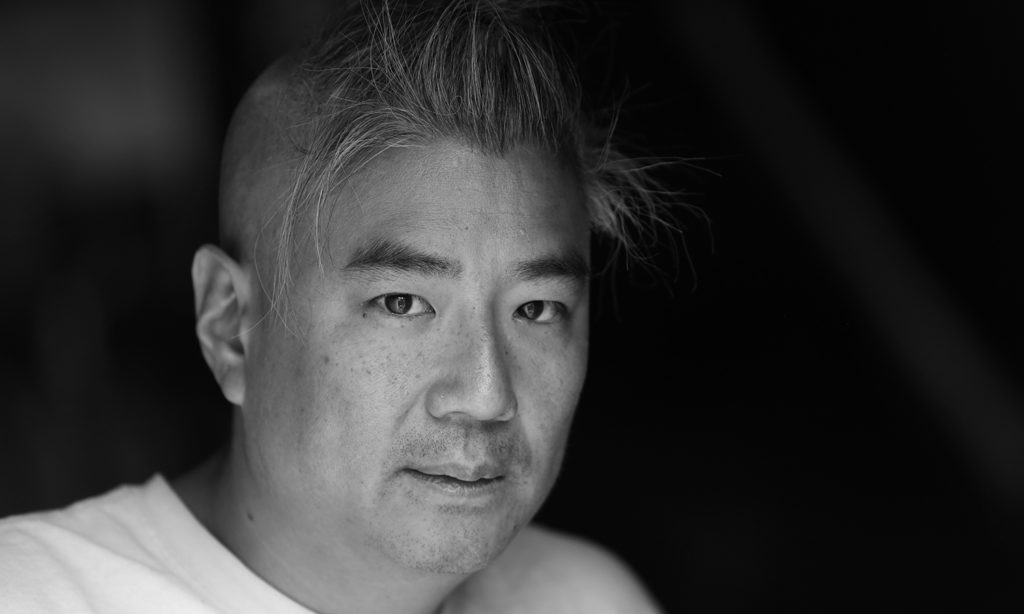
When Mark sat down with Humanitou, he was working on his latest round of cups for Poetry & Pottery, a free summer program hosted by Poetry Heals in Soda Springs Park.
We talk about why he’s uncomfortable with the word “artist,” and why people should let go of their rosy view of the artist’s ivory tower. We talk about influences and ego, and why a gallery is essential to making a career in art work.
Humanitou: You’ve been working as a professional artist for more than 25 years. Some would say you’re living the dream.
Mark: There’s a bit of freedom there. You make your own choices about what jobs you want to take or not take. There’s also a financial responsibility that you have to uphold and know that the freedom ends when you have to make the bread and butter.
The trick is not to exhaust yourself doing this bread-and-butter small stuff to the point where you can’t actually get the things you like to do done.
I don’t like calling myself an artist. I’m hesitant to use that term. That’s for history to decide. A lot of people call themselves that willy-nilly, and it doesn’t seem to mean much anymore. Calling yourself a potter, people know what that means. You have to have certain skill and work with clay.
Humanitou: What do you think is happening with “artist” and how people use it?
Mark: It doesn’t really mean much anymore. It’s so ambiguous. Anybody can call themselves that, and most people that do really aren’t.
If you want to get philosophical about it, it’s the idea that you’re elevating some work beyond everyday life to make it mean something more.
But it seems to be a discussion that never really convinces anybody. Everybody comes to it with their own preconceived notions. I’m not sure I could even say what art is or isn’t.
And, like I said, I think that’s for history to decide. I’d rather just make pots that, maybe, are a little better than things people have seen before.
I look at the pottery process as thinking about problems. Why can’t I do this, why can’t I do that? How can I solve these problems?
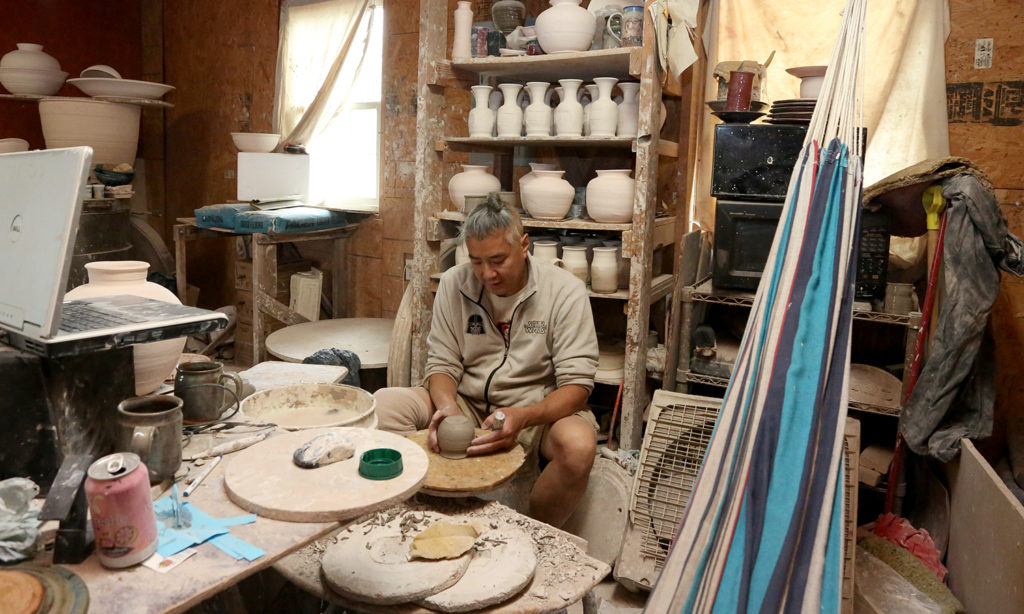
Humanitou: There are matters of science in a craft like this.
Mark: Oh, yeah. I know molar equivalents and weights, so I can figure out formulations for different ingredients. If I have to have cobalt carbonate versus cobalt oxide, I know it’s a two-to-one ratio if I want to switch from one to the other. But I also know why, because of the molecular weight of the atom in the different molecules.
Humanitou: Is this science all personal exploration or did you study it in college?
Mark: I’ve always been very strong in sciences. There was a time I thought it might be my life, because it’s my parents’ lives. My mom was in microbiology, biochemistry and did research into bone cell typing and enzymes. My dad’s a cardiologist.
I went in a different direction.
Humanitou: It’s not easy to sustain life as a professional artist. What has helped that to click in for you?
Mark: I think people really have to get the idea out of their heads of the artist’s ivory tower. It’s really not the way the world works. It’s always a collaboration with a business to figure out what that business needs, what kind of product they want to put forward.
It really seems like the best work is done in conjunction with the gallery or whatever business you’re talking about. You have an idea that you want to promote and you’re going to need help doing that.
Humanitou: What speaks to you so much about clay and making pottery?
Mark: You could talk about all sorts of different aspects. I don’t know. In the end, you’re kind of playing God. You’re starting with very little. Dirt.
And you’re making things that, hopefully, you find aesthetically appealing and others do, too. You’re learning physical properties of the world around you through the pieces, through the ingredients.
Humanitou: You put on a large show some years ago — 1,000 pieces — focused on the origami myth. You also are known for your Raku ware. Both are Japanese. Do you have a particular interest in Japanese aesthetics?
Mark: Raku is kind of a misnomer. That name got taken over in America. The Raku family in Japan has nothing to do with this process at all. They’re pissed their name got taken over.
Some of the first pieces that came out of experimental firings resembled some of their pieces, so people started calling it Raku.
They do a stoneware, high-fire black glaze that they put a red accent on and low-fire. It’s pretty dramatic red on black. I try to differentiate by calling it American Raku.
Humanitou: OK. With that in mind, is there something about the Japanese roots of that concept and the origami that appeals to you in a special way?
Mark: I have interest in aesthetics and ideas, period, wherever it comes from.
I’m a big fan of Bernard Leach’s work, and he was a big fan of Japanese work, as well, but he was an English potter. His claim to fame was trying to meld those two.
There’s always a certain perverse admiration for the discipline pursued with the Japanese potters where some of their apprentices have to make a hundred tea cups exactly the same, and then they mostly get destroyed and they have to make another hundred.
Which is a little perverse, because I was also taught that dead center means dead pot. You can make pots that are perfectly centered, but they don’t seem to have any life to them.
But I also have questioned if that saying came from somebody that couldn’t make a centered pot. (laughs)
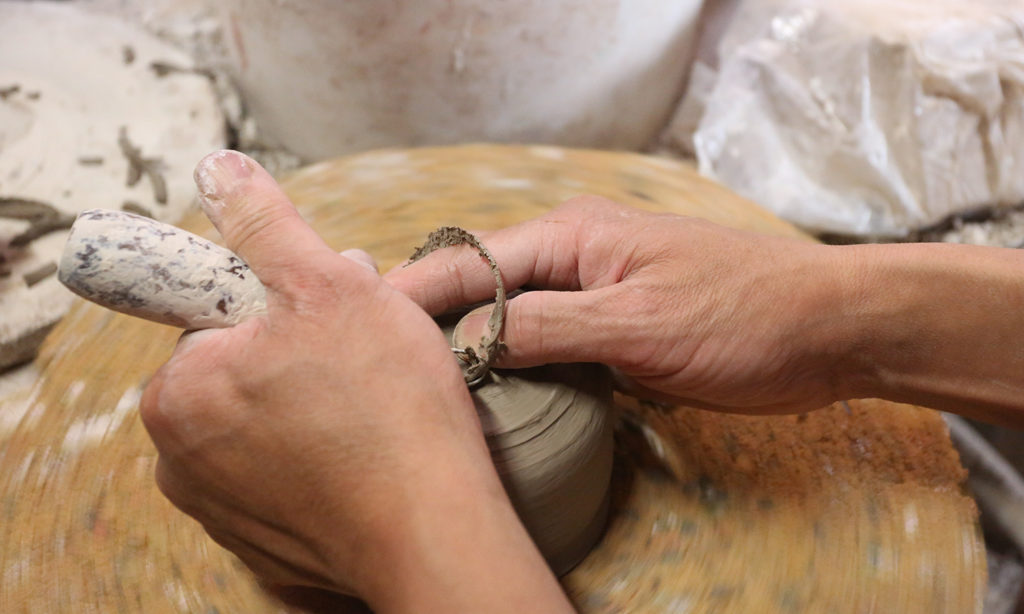
Humanitou: That brings to mind another Japanese aesthetic: wabi-sabi, the idea of beauty in imperfection.
Mark: Right. The idea is that you have to be able to make a set of 100 perfect pots before you’re allowed to explore the creative side. They want you to be able to have a foundation.
You talk about Jackson Pollock being a classically trained landscape artist before he started doing what made him famous.
They say, you can’t break the rules if you don’t know the rules.
Humanitou: You’ve added up well more than 30 years of work with pottery, back to your days as a high school student. I can’t imagine how many thousands of pieces you’ve made. Is that anything you’ve reflected on?
Mark: I think if you worry too much about the body of work that you’re making, then you’re looking back a little bit more than you should. You learn from the pieces you make and, hopefully, you can apply it to the new pieces you make.
Once it’s done and finished, you can give yourself a little time to admire it, but it really should get to someone else’s house or gallery, so you have room to make another one.
Humanitou: You said defining your work as art might better be left for history to decide. Do you mean after your work is done and it’s all that remains?
Mark: It might be a little bit flippant just to say history. That sounds a little pretentious, but in the end, I don’t think you define yourself as an artist. That’s something that’s going to be done by people looking at your work.
Maybe you’re a little too close to decide if it’s art or not. And, in the end, does your opinion really matter? You either made a piece you liked or a piece you didn’t’ like. Whether it’s art or not is a pretty ambiguous topic.
Humanitou: On the flip side, some might say the artist’s opinion is the one that does matter. Of course, selling it does require others to like it enough to put down money.
Mark: And that’s why you have a gallery as a go-between. Artists, a lot of times, are the worst sales people. That’s why the gallery gets half.
Humanitou: For lack of objectivity?
Mark: Lack of objectivity. Also, they’re going to sell themselves short. They know what time they put into that piece. They can say, “Well, I only put an hour on this. How can I get this huge amount of money for it?”
And they don’t think about the 20 years that they practiced before they could do that in an hour. And how long was it that they were designing it, and thinking about it?
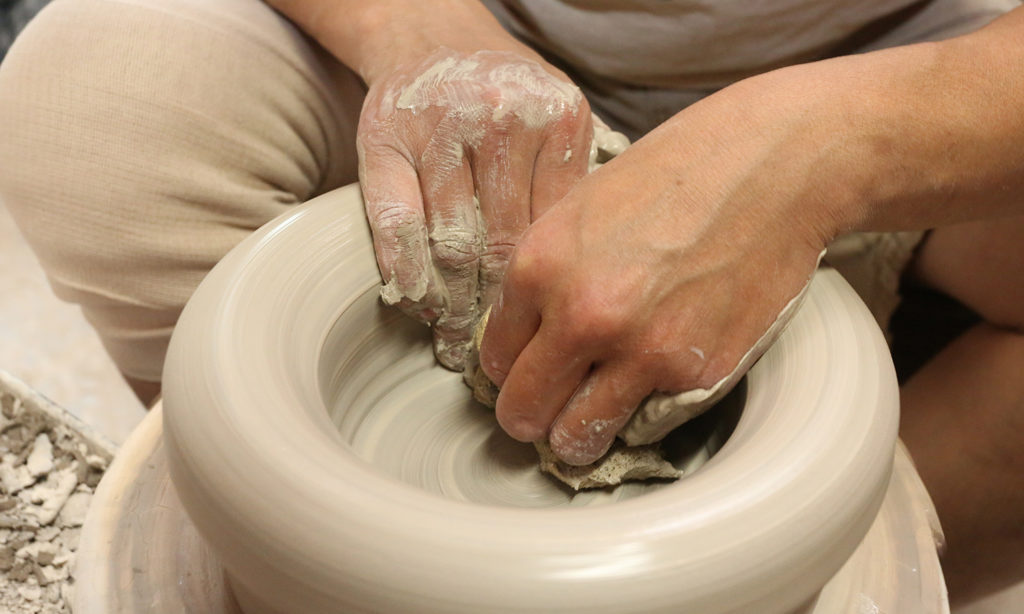
Humanitou: Does it matter to you 50 years from now all this work you have out in the world, in people’s homes–
Mark: No. (laughs)
Humanitou: Does it matter how they think of you and your work?
Mark: I’m not really in it for a legacy. I’m a little more egotistical than that.
There’s an amazing amount of ego in saying I’m making something better than anybody else and people should want that.
There’s enough ego involved in just making pieces in this day of 3-D printers and mass production, the idea of working with your hands and doing it the old-fashioned way, and still trying to push yourself to figure out new ways, too.
Mark Wong’s pottery is available directly (Wong Wares), and through local galleries in Manitou Springs, Colo.: Green Horse Gallery, The Whickerbill, Cherokee’s of Manitou, and through Manitou Brewing Co.
 This Humanitou conversation is cross-posted at PeakRadar.com. PeakRadar.com is the Pikes Peak region’s cultural calendar and digital cultural center, connecting residents and tourists with our vibrant arts community. Your source for what’s happening is PeakRadar.com!
This Humanitou conversation is cross-posted at PeakRadar.com. PeakRadar.com is the Pikes Peak region’s cultural calendar and digital cultural center, connecting residents and tourists with our vibrant arts community. Your source for what’s happening is PeakRadar.com!

